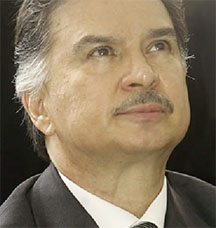NEW YORK, (Reuters) – Former Guatemalan President Alfonso Portillo yesterday admitted to taking $2.5 million in bribes from Taiwan in exchange for continuing to recognize the country diplomatically.

Portillo, 62, pleaded guilty in a federal court in New York to a charge of money laundering conspiracy, nearly year after he was extradited from his home country to face a U.S. indictment unveiled in 2010.
“I knew at the time that what I was doing was wrong, and I apologize for my crimes, take responsibility for them, and accept the consequences of my actions,” Portillo said.
Portillo, who served as president of Guatemala from 2000 to 2004, was extradited to the United States in May 2013 after a years-long fight in Guatemala’s courts, which had cleared the former president on embezzlement charges.
U.S. prosecutors had accused Portillo of laundering tens of millions of dollars that they said he embezzled from the Guatemalan government, including $2.5 million from Taiwan’s embassy in Guatemala intended to buy books for school libraries.
But at yesterday’s court hearing, Portillo said the $2.5 million wasn’t intended for libraries at all, saying instead they were “illegal payments from Taiwan.”
Manhattan U.S. Attorney Preet Bharara said if Portillo thought his position would prevent him from having to answer for accepting bribes to shape his country’s foreign policy and for embezzling funds, “he was wrong.”
“This office will aggressively pursue and prosecute individuals, irrespective of their position or title, if they engage in violations of U.S. laws,” Bharara said.
Brian Su, deputy director general of Taipei Economic and Cultural Office, said the Taiwanese government correctly manages all of its foreign aid programs “and has consistently attached the utmost importance to the proper handling of aid on the recipients’ end.”
Taiwan President Ma Ying-jeou, elected in 2008, “rejects checkbook diplomacy,” Su added.
China says Taiwan has no right to diplomatic recognition as it is part of China. The two have been governed separately since the Communists won China’s civil war in 1949. The Nationalists fled across a 110-mile-wide (180-km) strait to Taiwan.
Only 22 countries maintain diplomatic relations with Taiwan, including the tiny Pacific island states of Nauru and Palau, as well as Vatican City, Paraguay, Panama, Haiti, Nicaragua and Belize. In November, Gambia said it would cut diplomatic ties with Taiwan.
Portillo, wearing a dark suit and speaking in a raspy voice through a translator, said he received five checks for $500,000 from the Taiwan government from December 1999, just before he became president, to 2002 in exchange for diplomatic recognition.
Knowing the funds were illegal, Portillo said he agreed with others including Guatemalan bankers to carry the money to the United States and deposit it into bank accounts in Miami and Washington to conceal the source.
Some of the money from Taiwan was then transferred to an account in Europe, he said, where it was disbursed into accounts with different financial institutions in 2005.
David Rosenfield, a lawyer for Portillo, in a statement called his client a “good and decent person” who “made a mistake – an aberration in an otherwise unblemished life.”
U.S. District Judge Robert Patterson, who accepted Portillo’s plea, set sentencing for June 23.
Under a plea agreement, prosecutors agreed to stipulate that Portillo faced 46 to 71 months in prison under federal sentencing guidelines. Portillo has already served 50 months in prison, Rosenfield said in court, adding that he expected the time served to be applied to any sentence imposed.





